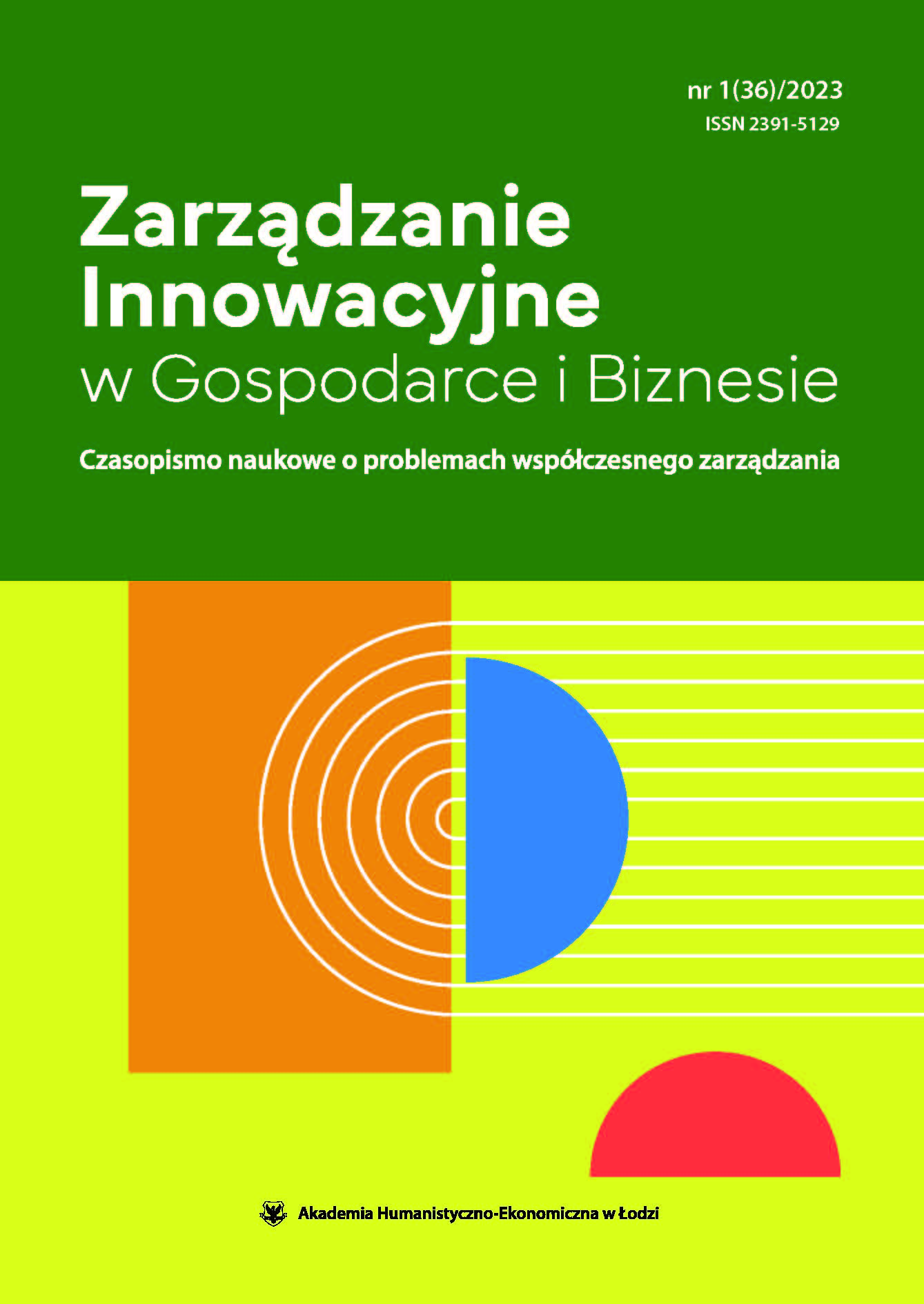Nowe technologie w rozwoju i zarządzaniu przedsiębiorstwem
DOI:
https://doi.org/10.25312/2391-5129.36/2023_05pnoSłowa kluczowe:
przedsiębiorstwo, zarządzanie, nowe technologie, strategie rozwoju, informatyka, automatyzacjaAbstrakt
Artykuł skupia się na nowych technologiach w kontekście rozwoju i zarządzania przedsiębiorstwem. Zostały w nim przedstawione różne aspekty wprowadzania nowych technologii, takie jak koszty, szkolenie pracowników czy zmiany w organizacji pracy. W artykule zostały również podkreślone korzyści oraz zagrożenia związane z implementacją nowych technologii do firmy oraz opisane strategie rozwoju oparte na technologiach, np. zastosowanie sztucznej inteligencji w procesie produkcyjnym lub wykorzystanie analityki danych do podejmowania decyzji. Cały artykuł zwieńcza podsumowanie, które wyjaśnia, że wprowadzenie nowych technologii jest nieuniknione dla przedsiębiorstw, które chcą pozostać konkurencyjne na rynku.
Pobrania
Bibliografia
Bandyopadhyay S., Sen J. (2018), The Impact of IoT on Enterprises, „Information Systems Frontiers”, 20 (3).
Biocca F., Kim J. (2018), Virtual and Augmented Reality in Industry: A Review and Roadmap for Future Research, „Journal of Business Research, 98.
Davenport T.H., Ronanki R. (2018), Artificial Intelligence for the Real World: Don’t Start with Moon Shots, „Harvard Business Review”, 96 (1). Deloitte (2016), Industry 4.0 and Manufacturing Ecosystems: Exploring the World of Connected Enterprises.
Elliott T. (2019), The Culture of AI: Everyday Life and the Digital Revolution, Routledge, New York.
Fitzsimmons J., Fitzsimmons M. (2019), Service Management: Operations, Strategy, Information Technology, Seventh Edition, New York.
Forbes (2018), AI is the Future of Business: Here’s How to Get Your Company Ready.
Frey B.C., Osborne M.A. (2013), The Future of Employment: How Susceptible Are Jobs to Computerisation?, https://www.oxfordmartin.ox.ac.uk/publications/the-future-of-employment [dostęp: 31.04.2023].
Huang Y., Li S. (2019), Investigating the Impact of Training on Employee Performance: A Comprehensive Research Review, „Human Resource Development Review”, 18 (2).
Jaworski M. (2018), Akceptacja nowych technologii w przedsiębiorstwie, „Przegląd Organizacji”, 94 (3).
McAfee A., Brynjolfsson E. (2017), The Business of Artificial Intelligence, „Harvard Business Review”, https://hbr.org/2017/07/the-business-of-artificial-intelligence [dostęp: 31.04.2023].
McKinsey Global Institute (2017), The Future of Work in America.
Nartey D.K., Mensah I.K., Amankwah-Amoah J. (2021), Blockchain Technology and its Potential Impact on the Audit and Accounting Professions, „Journal of Accounting and Management Information Systems”, 20 (1).
Nowak J. (2020), Wpływ kultury organizacyjnej na wdrażanie nowych technologii. „Ekonomia i Zarządzanie”, 12 (4).
Schaan M. (2019), Robotics and Artificial Intelligence, „International Journal of Production Research”, 57 (7).
Schwab K. (2016), The Fourth Industrial Revolution: What It Means and How to Respond, „Foreign Affairs”, https://www.foreignaffairs.com/world/fourth-industrial-revolution [dostęp: 31.04.2023].
Stavroulakis P. (2017), The Impact of Training on Employees’ Productivity and Performance, „International Journal of Education and Development Using Information and Communication Technology”, 13 (2).
Opublikowane
Numer
Dział
Licencja
Prawa autorskie (c) 2023 Akademia Humanistyczno-Ekonomiczna w Łodzi

Utwór dostępny jest na licencji Creative Commons Uznanie autorstwa – Na tych samych warunkach 4.0 Miedzynarodowe.



